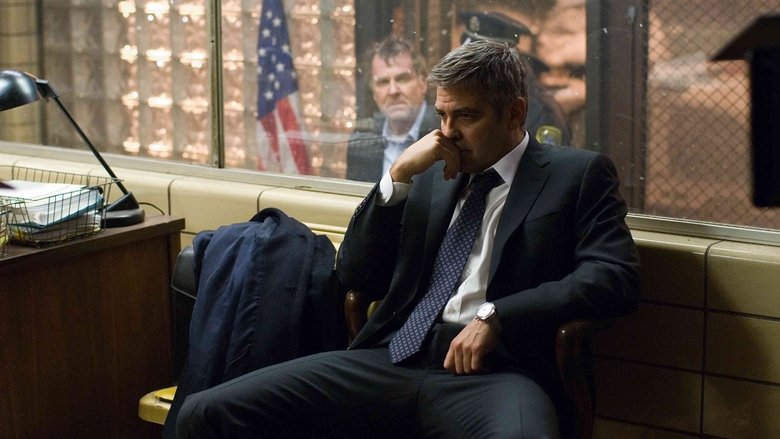← Back to Reviews

in
Earlier this year, a film called Fracture was released. It deviated from your standard legal thriller in several prominent ways. Michael Clayton deviates from the formula, too, but it does so subtly, and well enough that we barely even notice.
The film stars George Clooney as the titular Michael Clayton. He's a lawyer, but he refers to himself as a "janitor" because his job depends on cleaning up his clients' messes as much as it does his legal acumen. He's good at what he does, but he's not invincible, or a rising star in the legal world. He's in his late 40s, and worried about his future. Though he's genuinely invaluable, his duties require that he not be particularly visible, and when rumors of a merger circulate at his firm, he wonders if he's been so good at his job of keeping things quiet that no one will know it.
He receives word that his friend and colleague Arthur (Tom Wilkinson) has apparently lost his mind; he stripped down naked and started screaming at a deposition. This jeopardizes both the merger and the $3 billion class-action lawsuit Arthur was working on. He speaks of seeing the light for the first time, and wasting his life, and there's a certain poetry to his ramblings.
Beyond these facts, the plot is not of much consequence. As in any legal thriller, there's a large company involved, and they've done something wrong which they're attempting to cover up. It goes without saying that irrefutable proof of their wrongdoing (and subsequent cover up) is floating around. But Michael Clayton doesn't fall into the cliche of trying to build suspense over just what it is the company (dubbed "uNorth") has done wrong. We've seen enough of these to get the basic idea; they've harmed ordinary people and will go to virtually any length to hide it. We get some specifics, but they are (wisely) not the film's climax.
The film is also set apart from other entries in the genre by the humanity of its characters. Michael Clayton fits no obvious stereotype; he has a gambling problem, and an unreliable brother who's left him with a mountain of debt after a failed business venture. He's good at his job, but he's no action star. At times, he avoids death by sheer luck.
Michael Clayton even humanizes its villains. Tilda Swinton, primarily, is shown as nervous and apprehensive about what's going on. We see her hastily practicing her responses before an interview, and realize that while she's doing terrible things, she's not evil. This is a film that is not content to paint horns on its bad guys and leave it at that. Every character is three-dimensional, and the movie goes to great lengths to show us that even good people can allow themselves to become part of bad things.
The result is a film of incredible nuance that inevitably lacks a typical message. If there is a message, it is this: real life is always more complicated than the movies would have you believe.
The film stars George Clooney as the titular Michael Clayton. He's a lawyer, but he refers to himself as a "janitor" because his job depends on cleaning up his clients' messes as much as it does his legal acumen. He's good at what he does, but he's not invincible, or a rising star in the legal world. He's in his late 40s, and worried about his future. Though he's genuinely invaluable, his duties require that he not be particularly visible, and when rumors of a merger circulate at his firm, he wonders if he's been so good at his job of keeping things quiet that no one will know it.
He receives word that his friend and colleague Arthur (Tom Wilkinson) has apparently lost his mind; he stripped down naked and started screaming at a deposition. This jeopardizes both the merger and the $3 billion class-action lawsuit Arthur was working on. He speaks of seeing the light for the first time, and wasting his life, and there's a certain poetry to his ramblings.
Beyond these facts, the plot is not of much consequence. As in any legal thriller, there's a large company involved, and they've done something wrong which they're attempting to cover up. It goes without saying that irrefutable proof of their wrongdoing (and subsequent cover up) is floating around. But Michael Clayton doesn't fall into the cliche of trying to build suspense over just what it is the company (dubbed "uNorth") has done wrong. We've seen enough of these to get the basic idea; they've harmed ordinary people and will go to virtually any length to hide it. We get some specifics, but they are (wisely) not the film's climax.
The film is also set apart from other entries in the genre by the humanity of its characters. Michael Clayton fits no obvious stereotype; he has a gambling problem, and an unreliable brother who's left him with a mountain of debt after a failed business venture. He's good at his job, but he's no action star. At times, he avoids death by sheer luck.
Michael Clayton even humanizes its villains. Tilda Swinton, primarily, is shown as nervous and apprehensive about what's going on. We see her hastily practicing her responses before an interview, and realize that while she's doing terrible things, she's not evil. This is a film that is not content to paint horns on its bad guys and leave it at that. Every character is three-dimensional, and the movie goes to great lengths to show us that even good people can allow themselves to become part of bad things.
The result is a film of incredible nuance that inevitably lacks a typical message. If there is a message, it is this: real life is always more complicated than the movies would have you believe.
